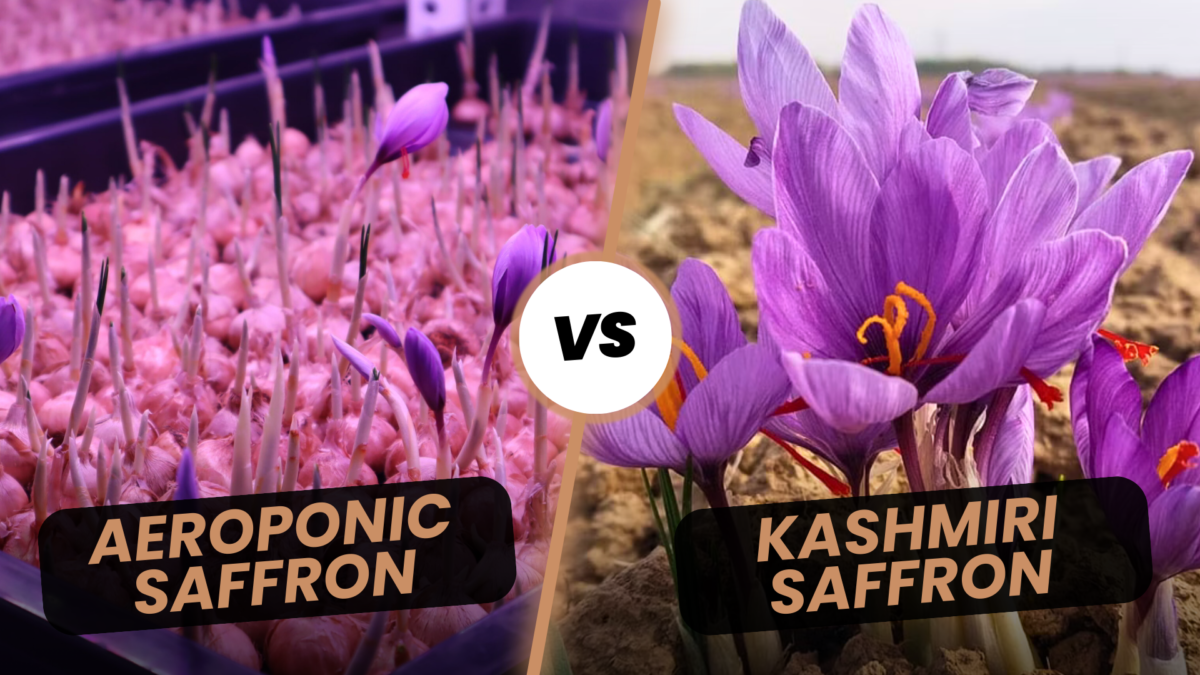
Saffron Sabudana Vada: Tapioca Fritters with Peanuts
February 23, 2025
Saffron Avocado Toast with Poached Eggs & Chili Flakes: Gourmet Breakfast
March 1, 2025Saffron, often referred to as “red gold,” is one of the most expensive and sought-after spices in the world. Known for its unique aroma, vibrant colour, and medicinal properties, Kashmiri saffron is considered the finest in the world. Recently, a new trend has emerged in India – aeroponic saffron farming. This innovative method of cultivation has sparked interest among farmers and enthusiasts, especially those looking to grow saffron bulbs. At buykashmirisaffron.com, we receive 10-50 calls daily from people inquiring about saffron bulbs and aeroponic farming. But the question remains: Can aeroponic saffron farming replicate the authentic aroma and quality of naturally grown Kashmiri saffron? Let’s explore.
What is Aeroponic Saffron Farming?
Aeroponic farming is a soilless cultivation method where plants are grown in an air or mist environment. The roots are suspended in the air and nourished with a nutrient-rich mist. This technique is gaining popularity due to its efficiency, water-saving benefits, and ability to grow crops in controlled environments.
In the context of saffron, aeroponic farming involves growing saffron bulbs (corms) in a controlled environment without soil. This method is particularly appealing to farmers in regions where the natural climate and soil conditions are not ideal for saffron cultivation.
Why is Aeroponic Saffron Farming Trending in India?
- High Demand for Saffron Bulbs: With the rising interest in saffron cultivation, many farmers and hobbyists are looking for high-quality saffron bulbs to start their own farms. At buykashmirisaffron.com, we’ve noticed a significant increase in inquiries about saffron bulbs, especially for aeroponic systems.
- Controlled Environment: Aeroponic systems allow farmers to control factors like temperature, humidity, and light, which are crucial for saffron growth. This is particularly beneficial in regions where the natural climate is not suitable for saffron cultivation.
- Water Efficiency: Aeroponic farming uses up to 90% less water compared to traditional farming methods, making it an environmentally friendly option.
- Space-Saving: Aeroponic systems can be set up vertically, making them ideal for urban farming or areas with limited space.
The Challenge: Can Aeroponic Saffron Match the Aroma of Natural Kashmiri Saffron?
While aeroponic saffron farming offers several advantages, there’s one critical factor that sets Kashmiri saffron apart – the natural environment of Kashmir.
The Role of Kashmir’s Climate and Soil
Kashmir’s unique climate, with its cold winters, moderate rainfall, and well-drained soil, creates the perfect conditions for saffron cultivation. The saffron grown in Kashmir’s Pampore region is renowned for its deep red colour, strong aroma, and high crocin content (the compound responsible for saffron’s colour and flavour). These qualities are a direct result of the region’s natural environment, which cannot be fully replicated in an aeroponic system.
Aeroponic Saffron vs. Natural Kashmiri Saffron
Even if the saffron bulbs used in aeroponic farming are sourced from Kashmir, the final produce may not have the same aroma and flavour profile as naturally grown Kashmiri saffron. This is because saffron’s unique characteristics are heavily influenced by the soil composition, altitude, and microclimate of the region. While aeroponic systems can mimic some of these conditions, they cannot fully replicate the natural ecosystem of Kashmir.
A Comparison: Kashmiri Saffron vs. Iranian Saffron
It’s worth noting that Iran is the largest producer of saffron in the world, contributing to over 90% of global production. However, there’s a significant difference between Iranian and Kashmiri saffron:
- Aroma and Flavour: Kashmiri saffron is known for its intense aroma and slightly sweet flavour, while Iranian saffron tends to be milder.
- Colour: Kashmiri saffron has a deeper red colour due to its higher crocin content.
- Medicinal Properties: Kashmiri saffron is often considered superior for its medicinal benefits, including anti-inflammatory and antioxidant properties.
These differences highlight the importance of the natural environment in producing high-quality saffron.
Final Thoughts: Is Aeroponic Saffron Farming Worth It?
Aeroponic saffron farming is undoubtedly an innovative and promising method, especially for regions where traditional saffron cultivation is not feasible. It offers several benefits, including water efficiency, space-saving, and controlled growing conditions. However, it’s important to manage expectations.
While aeroponic systems can produce saffron, the final product may not match the exact aroma, flavour, and quality of naturally grown Kashmiri saffron. The natural environment of Kashmir, with its unique climate and soil, plays a crucial role in producing the world’s best saffron.
At buykashmirisaffron.com, we believe in celebrating the authenticity of Kashmiri saffron. Whether you’re interested in aeroponic farming or simply want to experience the true essence of Kashmiri saffron, we’re here to guide you every step of the way.
Explore our collection of premium Kashmiri saffron today. Let’s keep the legacy of authentic Kashmiri saffron alive!
For more information or to purchase saffron bulbs, visit buykashmirisaffron.com or call us at +91-88250-59929





